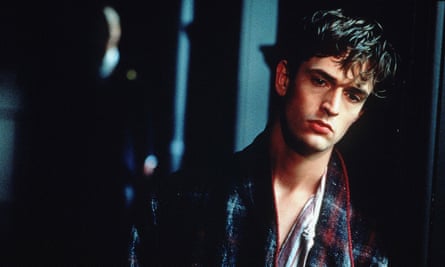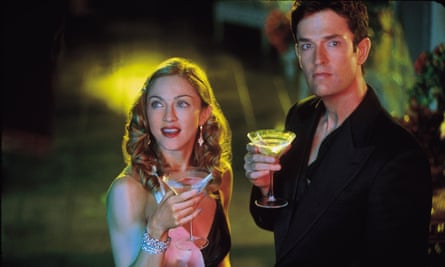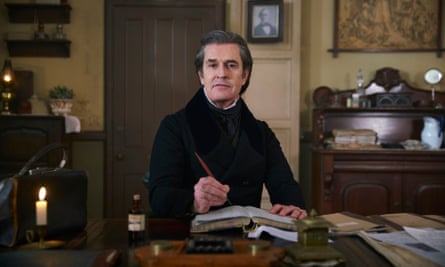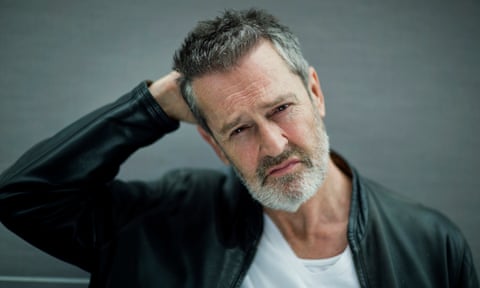In one way, Quacks is a natural place to find Rupert Everett. The keenly British comedy has “something of the Carry On, Stanley Baxter era” about it, he says – a sharp, playful script; a generous, gracious ensemble cast also featuring Rory Kinnear and Mathew Baynton; very accurate historical detail, such as Everett’s thunderous physician trying to cure what sounds like cystitis with the topical application of a baked potato. Really, what could be more fitting? Who else would you cast?
Yet the legacy of his first, dazzling appearance into British culture, the stage and then film version of Another Country, means that if you were alive and at all conscious in the early 1980s, you can’t help thinking of an Everett sighting as a rare honour, like seeing a ptarmigan, or an MP at a bus stop.
We are in a pub in Paddington station, London, drinking fizzy water because it is 10am, talking about his youth, which looked so gilded. “To be honest, that whole period, I was living in basic terror for my life. I’d had a very promiscuous sex life from the moment I arrived in London. I’d thrown myself into the gay world, coming from this convent background, and then Aids began and there was no way of finding out if you carried the virus until 1985, the HIV test. So my whole world, lots of people that I’d been with, were dying. And dying in a most terrifying way. Everybody was terrorised by the disease. Even people who loved you, your family, you’d notice them taking your plate and washing it separately. That was my whole world – of every 60 seconds, 30 were in sheer panic. Especially being in front of a camera; I lived in fear of a cameraman saying: ‘What’s that on your face, Rupert?’”
He says all this with a certain – I suppose you’d call it a trademark – languid humour, while at the same time very precisely, economically, conjuring a time that is so rarely memorialised, when men in their prime were dying, and society just moved around it, like an aneurysm in the bloodstream. He remembers sitting in a hotel room with the actor Amy Irving when an ex-boyfriend of his appeared on a current affairs show, one of the first people to come out and say he had “gay cancer”: the fear draining the blood out of his body, his skull tightening. “I was always wondering where I would go to hide. You were getting quite famous on the one hand, and on the other, preparing to disappear completely.”
In 1985, he discovered that he had evaded the virus, and notes archly the irony of “going through that period hating my parents, but maybe they were the people who protected me – with their weird DNA strands – from that disease”. He interlaces details – having to stay with friends as they died, all the time fighting a rising terror – which paint this trauma so vividly that all you can say is: “That is awful.”
“Well,” he says urbanely, “all generations have their cross to bear. All of them seem insurmountable, and unfair.” But … that was insurmountable, and it was unfair.
“How can you call a virus unfair?”
Where’s the justice in illness?
“It’s the human condition.”
I’ve never known anyone so stubborn be so charming, or anyone so combative, so charismatic. It’s like fencing with Puss in Boots.

Everett has said in the past that he regrets coming out so young because it closed down avenues in acting. I wonder whether anything has changed very much, but he is a bit more ambivalent now about Hollywood’s attitude to sexuality. “It’s as much to do with the people who own theatres as it is to do with the executives who run Hollywood. If you look at the conglomerates who own theatre chains in America, they’re incredibly rightwing. Nutty. You lot don’t know anything; you write about showbusiness but you don’t know anything.”
He talks a lot about “PC culture” – Quacks “is able, because it’s period, not to have to be politically correct, which is refreshing”. He doesn’t mean political correctness in its original sense, of trying not to offend people by calling them black lesbians and then laughing, but rather its more puritanical yet confusing modern definition, where “only the villain smokes, only the villain swears”, a lot of prudishness hiding behind caricatured politics, a lot of taboos developing and going unchallenged. “Everyone’s so afraid now, aren’t they?”
He dates the other big change in cinematic culture to the publication of box-office receipts, which started in the early 80s. “It became about the audience, not the film. It was like Eve eating the apple; after that, everything was different. It was a big change in the mystery of the situation.” Alongside that, the Thatcher-Reagan pincer movement of deregulation which, in a complex but credible segue, changed what it meant to be an actor. “Before all that, an actor could never advertise a perfume. You weren’t allowed to. You gave yourself to that job and that’s all you did. You’d never write a kiss-and-tell book. With the arrival of management culture, that all changed, because they saw the actor as a commodity to be asset-stripped.” Yes, but isn’t that why this peculiar conservatism abides on the big screen – it doesn’t catch up with culture around race, women and homosexuality because it is stuck in this market-driven Fordism, any colour so long as it’s white?

No, absolutely not, he doesn’t agree with that. “That film I made with Madonna …” He pauses as though to remember its name, although I can’t believe he has forgotten it, since there is a whole chapter in his autobiography, Red Carpets and Other Banana Skins – which is brilliant, by the way – about what a world-beating disaster it was. “The Next Best Thing. The studio who made it were completely into maximising what they thought they could get out of me as a gay person. There had been posters on Sunset Boulevard; 20 million gay people in America, and they wanted to get to them. We had a huge weekend in Miami, and they asked all these little gay magazines with poppers ads in the back to try to reach out to this elusive 20 million audience, which would have made me, by the way, if I’d managed it, into a huge star.”
Maybe it seemed a bit cynical. “Cynical?” Vexation blazes out of his eyes. “How is that cynical?” Well, you know … saying: “You’re gay, you’re bound to love this person who is also gay.” People don’t always like that. “That’s not cynical, that’s marketing!” What I meant was that when you get a chick flick and you’re supposed to like it because you’re female, and there are shoes in it, and a wedding … Women don’t always go for that. “Well, then all films are marketed, all films are cynical.” I go another way; they probably didn’t devise The Sopranos to appeal to American-Italians. “Are you saying the Sopranos wasn’t marketed?” No, I’m saying that when you profile your audience, it can backfire. “I disagree entirely.”
It feels as if we’re going to be stuck down this well for ever. Maybe I should consider backing down. Then, suddenly, he says: “I don’t want to go much into The Next Best Thing, because I know exactly where you’re going to lead to next.” Madonna’s birthday? (She turned 59 last week.) He gives a sphinxish look. We don’t talk about Madonna. They fell out in the 00s. But we do talk a bit more about the film, which actually sounds quite traumatic, the scripts rehashed, the director John Schlesinger at one point falling asleep during a scene, the reviews so bad they made tabloid splashes. Yet when he writes about it, it is with affable detachment.
“People always say this about me. I’m not detached. The background I come from, stiff upper lip, military, naval upbringing, is quite detached. I’ve always found myself quite hysterical, though. But being an hysteric means that you can get over things very quickly. Especially if you’re a performer, you can swing from one mood to another in the course of a sausage roll. I used to smoke, also, quite a lot of weed, so that makes everything funnier.” Even his punctuation is witty, that headmasterly “also”.
The Next Best Thing was in 2000, after which he had a wilderness period: “It’s like snakes and ladders. Career death is rather like real death, so it gives you an opportunity to see what real death feels like. One minute, you’re careering round the corridors of power, and everybody’s going: ‘That’s a fabulous idea.’ The next minute, you’re still careering around but you’re like the Canterville Ghost: everybody’s walking right through you and you’ve died, and you didn’t realise.” How many times does that happen? “To me, non-stop. You build up this character for yourself as a successful person, and it feels indestructible, especially when you’re young, and then suddenly, the only person who will treat you like the big star you were is probably your mum, and some goon. And you think, who am I? Am I that old person who everyone treated like this one thing, or this new one who has three seconds to get his point across and get out?”

Now probably isn’t his career apex, but he has managed after eight years to get away his biopic about Oscar Wilde, The Happy Prince, which is out next year, almost (not quite) in time for the 50th anniversary of the decriminalisation of homosexuality in this country. “He is the beginning of the gay liberation movement, and it’s fantastic for us to know about that and hold on to it. Sometimes you can read about our lives and think, ‘God, this is worse than a third-world country, we’re having such an awful time.’ But seeing what happened to Oscar Wilde is a terribly valuable thing, as a gay person; it gives you a sense of history, and belonging, and responsibility, and pride. It is only five seconds ago, in world history, that he died. Perspective is what might get us through all this: given the work that I do, and the business I’m in, that’s the most valuable thing I can bring.”
He is quite pessimistic about human nature (he thinks we are mostly defined by isolation, anxiety, violence and greed, and odd bursts of compassion), and dispirited about politics (“this amazing feeling of confrontation, as if everyone’s fighting a death moment: if I don’t win this argument, my side will die. It’s sort of Games of Thrones-ish”). He is vehemently anti-Brexit, and wouldn’t even vote in the last general election because he finds both sides appalling. Yet his stated views are in stark contrast to what he emanates, which is all humour, compassion, humility, imagination.
“In the end, the reality is, you’re rushing for the bus aged 78 to go for an audition at the National Theatre, and then bursting a blood vessel. Or, I’ve been in a couple of plays where one of the actors was just too old, couldn’t remember it by the dress rehearsal, had to be taken out, let go. It’s so heartbreaking, but also beautiful, dignified, when you see it close-up, the marvellous trouperness. There’s a line in the Happy Prince: there’s no mystery so great as suffering.”
The full series of Quacks is on iPlayer. The series continues on BBC2 on Tuesdays
